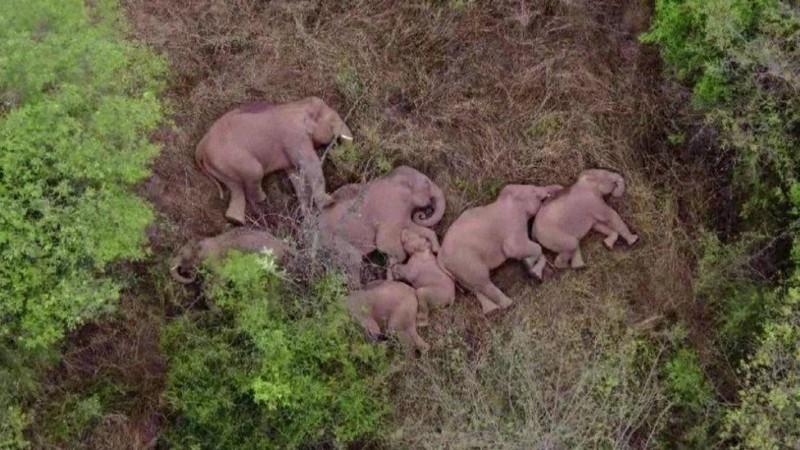As the netizens found themselves smitten by a viral video of a herd of Asian elephants resting during its migration journey in China early this week, here's an expert who's spreading awareness on the issue in a creative way.
Meet elephant biologist Dr Sanjeeta Pokharel who lives in Bangalore and has been researching and exploring the fascinating lives of elephants in the wild, captivity, and human-dominated areas for several years. She has also been raising awareness about elephant ecology and conservation in a creative way through her copyrighted character 'Bhunte'.
Dr Pokharel's 'Bhunte' introduced 'Wang Shu' to its followers and also the fact how humans have vastly inhabited lands that once belonged mostly to the largest land mammal.
And so the story goes

Wang Shu and his herd members are travelling through the cities from their home for a few months. Every human, wondering why Wang Shu's herd is making such a long tour in their habitations, barely know that Wang Shu wanted to be in a new home and also meet his friend, Bhunte. It was Wang Shu's grandmother who knew the route, which she remembered from her journey with her grandmom 40 to 50 years back when she was of Wang Shu's age.
She started the journey, therefore. To her dismay, she found that there were no streams to cross and splash water, which she remembers playing with her tiny trunk when her grandmom dragged her out of the water. No trees to tear up the branches to swat away the flies. She was completely perplexed when she found that there were concrete floors, lights, vehicles, houses, crowds, and more concrete! She tried to search more. She guided her herd through these houses and cities, yet did not reach the forest. Wang Shu was tired and so were his cousins.
Wang Shu's grand-mom had no choice but to be back. On their way back to their old home, they rested. Wang Shu and his aunts fell asleep as they travelled almost 500 km. In his dream, Wang Shu saw Bhunte approaching him with his ears raised high and trumpeting towards him. He was excited. He woke up and climbed over his mother to get more sleep. Once Wang Shu will grow into an old Tusker, he will certainly start this journey again to meet his friend.

Why elephants migrate?
In a conversation with IBTimes, Dr Pokharel explained, "Elephants migrate seasonally or occasionally like most wild species but they also retain old memories. No scientist can ever specifically point out why elephants migrate, could be to find a new habitat or to find more resources, or maybe to get on an old-remembered path. As humans, we need to accept that we are living in their natural habitat."
On June 8, Chinese state media released drone footage that showed a herd of 15 elephants, including a young calf, taking a rest in the forested area of Kunming, the capital of Yunnan province.
According to the official Xinhua news agency, the group of Asian elephants, which includes three calves, originally lived in a nature reserve and have trekked for nearly 500 km along highways and through fields of crops over the past few months.
Human-elephant interactions vs conflict
During the process of capturing the Chinese elephant herd's journey, a few video footages of people waking up and opening their city windows to the site of the elephant herd walking around, crossing the roads went viral too, catching citizens in disbelief. If only they understood that the elephants were probably on their path that was once laid with trees and streams but now replaced with buildings and vehicles.
Dr Pokharel who hails from Nepal is currently a visiting scientist at the Centre for Ecological Sciences at the Indian Institute of Science. Her last work was based on Japan's captivated elephants and how stress levels could be identified in captivated Asian elephants through their tail hair.
Having spent years studying the species in different environments, she is conscious to not use terms such as 'conflict', 'vulnerable', 'submissive' to address human-elephant relationships. She prefers to call it an 'interaction' between two species and shares how the intelligent beings living in human-dominated areas have altered their natural habits to adapt to their new environment.
"If you observe an elephant in the wild, its natural behaviour would be to forage for 16 hours during the day—it will walk around, eat, rest, walk again, eat, rest—and at night, it will sleep for around 8 hours," she explains adding that not many studies have been done to research elephants' sleep patterns.
"But in human-dominated areas especially villages surrounding forests where elephants are found, elephants have learned to adapt and alter their natural behaviour. They try to avoid humans and hence, hide during the day and in the night when they know everybody is asleep, they come out to find food and eat. Unlike in the wild where they eat at leisure, here, they eat whatever they find hurriedly and run away as soon as they can," she clarifies further citing the elephant's human avoidance behaviour.

















